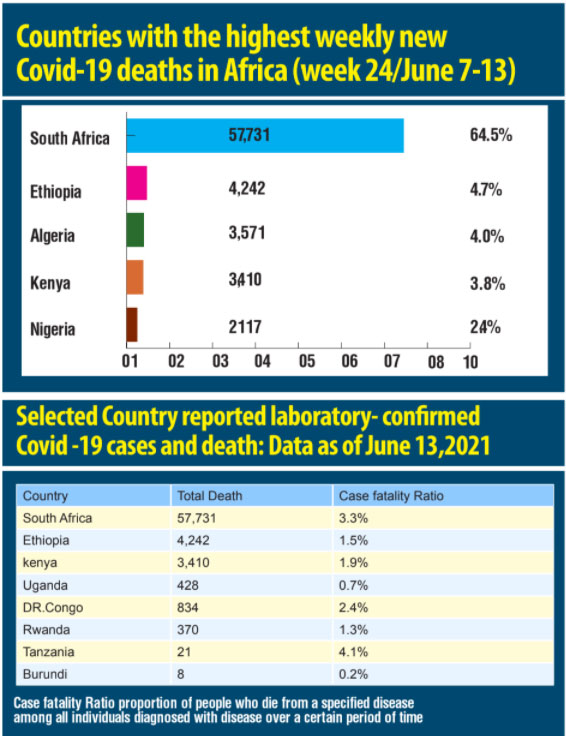
Joseph Nsubuga, the General Manager of Uganda Funeral Services says although his company has in the past been involved with burying the remains of Ebola and Marburg victims in Uganda, he says he had not witnessed anything like what he is seeing now.
Nsubuga says his staff are burying close to 10 people every day. In normal times, that would have been a week’s work for his funeral home. Another funeral home manager, Jane Ashaba Kanya of Funeral Supplies Uganda, agrees with Nsubuga.
She told local broadcaster, NTV Uganda on June 17 that her staff are getting overwhelmed. Her phone never stops ringing as she receives orders for her burial services. She fears her staff might eventually get sick with the disease since many of the bodies they are burying are COVID-19 victims and yet PPE equipment required for this kind of work is costly. Yet it seems Nsubuga and Kanya’s funeral homes still have a lot of work to do.
Hospital managers across the country have reported an upsurge in hospitalization of COVID-19 patients. At Mulago Hospital, Uganda’s largest and most equipped health facility, all the 27 Intensive Care Units are occupied. So are the High Dependency Units. Hospital administrators nationwide are reporting similar situations in their hospitals.
Most patients in the Intensive Care Units (ICUs) require huge supplies of oxygen which unfortunately is running out according to Dr. Musenero.
She told journalists that although there have been calls for the increase of oxygen production; still the number of patients who need oxygen has markedly gone up.
The result is ambulances running itineraries to private oxygen manufacturing companies to pick or refill medical oxygen canisters. At Oxygas Ltd, one of the private manufacturers of medical oxygen, an empty cylinder now costs Shs 2 million, up from Shs 700,000 it cost at the beginning of the month.
According to a Medicins San Frontieres (Doctors without Borders) briefing paper, “Gasping for Air: The deadly shortages in medical oxygen for COVID-19 patients,” which was published in May 2021, medical oxygen is the single most important medicine for treating patients with COVID-19.
Yet this life saving treatment for critically ill patients has been scarce in many health facilities in several countries.
But Dr. Aceng says Uganda is not short of oxygen. She says Mulago has four medical oxygen plants while all regional referral hospitals have capacity to produce their own oxygen. She added that private companies in the country are also able to ramp production if needed.
Aceng said, at the moment, what Uganda lacks and perhaps needs help from the international community, are the receptacles to carry the medical oxygen. She said Uganda urgently needs about 8000 cylinders.
But Dr. Olive Kobusingye, a researcher at Makerere University’s College of Health Sciences told The Independent on June 17 that “Uganda is generally suffering the consequences of mistrust of people in their government.”
“Ugandans only started taking the pandemic seriously after seeing their immediate family members and friends dying,” she says.
She noted that although President Museveni noted in his June 7 address that everyone must take individual responsibility, this is the time for the government to come in and help the ordinary citizens.
“There are certain things that the government must do for the people who pay taxes,” she said, “Individuals cannot, for instance, procure vaccines and mass testing of people is in the realm of government.”
But she said: “Uganda is a society where we do not generally care for the vulnerable.” That needs to change.
Fortunately, there are also some positive stories like that of Dr. Sam Lyomoki, a former Workers MP just who recovered from COVID-19 at Mulago National Referral Hospital. He told The Independent on June 17 that he early this month ended up at Mulago National Referral Hospital after a private health facility he did not wish to disclose asked him to pay Shs3 million everyday for a hospital bed.
“The private facilities are just trying to take advantage of desperate people. Some people go to private hospitals but they then realise that the private health facilities cannot handle the cases.”
 The Independent Uganda: You get the Truth we Pay the Price
The Independent Uganda: You get the Truth we Pay the Price


